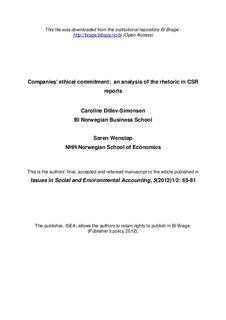| dc.contributor.author | Ditlev-Simonsen, Caroline D. | |
| dc.contributor.author | Wenstøp, Søren | |
| dc.date.accessioned | 2012-03-28T11:43:30Z | |
| dc.date.available | 2012-03-28T11:43:30Z | |
| dc.date.issued | 2011 | |
| dc.identifier.issn | 1978-0591 (e-utg) | |
| dc.identifier.uri | http://hdl.handle.net/11250/93470 | |
| dc.description | This is the authors’ final, accepted and refereed manuscript to the article | no_NO |
| dc.description.abstract | This paper investigates rhetoric applied in 80 Corporate Social Responsibility (CSR) reports in 2005. A taxonomy of five distinct rhetorical strategies for describing the purpose of CSR is applied; Agency (profit), Benefit (collective welfare), Compliance (laws and contracts), Duty (duties), and Ethos (virtue). The findings reveal that very different rhetoric is applied. Ethos is the most common ethical perspective expressed in the reports, Benefit and Agency are on second and third place. Specific patterns of ethical reasoning appear to be common, while other possible reasoning strategies are rare. The most prevalent pattern of ethical reasoning is to link Agency and Benefit perspectives, claiming that Benefit is done for the sake of Agency. These findings constitute a new approach in CSR research. | no_NO |
| dc.language.iso | eng | no_NO |
| dc.publisher | ISEA | no_NO |
| dc.subject | corporate social responsibility (CSR) | no_NO |
| dc.subject | reporting | no_NO |
| dc.subject | ethics | no_NO |
| dc.subject | rhetoric | no_NO |
| dc.title | Companies’ ethical commitment: an analysis of the rhetoric in CSR reports | no_NO |
| dc.type | Journal article | no_NO |
| dc.type | Peer reviewed | no_NO |
| dc.source.pagenumber | 65-81 | no_NO |
| dc.source.volume | 5 | no_NO |
| dc.source.journal | Issues in Social and Environmental Accounting | no_NO |
| dc.source.issue | 1/2 | no_NO |
